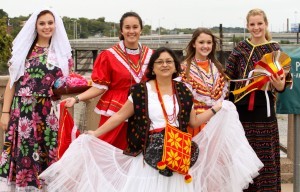
Irma Acevedo, a parishioner at St. John Neumann Church in West Knoxville and a Spanish teacher at Farragut High School, poses in Mexican dress with her students, (from left) Rachel Kosier, Valerie Martinez, Karli Rist, and Sarah Krueger, at the HoLa Festival in downtown Knoxville on Oct. 6.
Photos by Stephanie Richer
The Diocese of Knoxville was well represented Oct. 6 at the annual HoLa Festival, where the smiles of participants and visitors brought light and warmth to downtown Knoxville.
The HoLa Festival was organized by Hora Latina, a local organization whose mission is to promote Hispanic culture in East Tennessee.
The parishes and schools in the diocese that participated in the festival reflected the diversity of the Hispanic community.
Georgina Moore and Adriana Gonzales from St. Thomas Church in Lenoir City were busy readying several girls from the parish’s Coro de Niňos (Children’s Choir). The Hispanic community at St. Thomas is about half Mexican and half Guatemalan, Moore said, and the choir averages 10 children, ranging in ages from 5 to 11. The girls — Nizga Aguilar, Judith Aguilar, Grace Moore, Jennifer Gonzales, and Maria Cornejo — performed “Que Canten Los Niňos,” a song that calls for a happy world of peace for children.
Aurora Carvajal was selling delicacies from Colombia, along with her husband, Fernando, her daughter, Erica, and Erica’s boyfriend, Freddie Gonzales — all parishioners at All Saints Church in West Knoxville. Erica is a graduate of Knoxville Catholic High School and her younger brother, Diego, attends St. John Neumann School.
Aurora, a native of Bogota, prepared empanadas de papa (potato) as the others served a constant stream of hungry customers.
Irma Acevedo, a native of Guadalajara, Mexico, teaches Spanish at Farragut High School and attends St. John Neumann Church in Knoxville. She and her students set up a booth where visitors could learn about the different traditions found in Mexico. Wearing native dresses representing Jalisco, Oaxaca, and Michoacán, she and her students provided color to the Parade of Nations during the festival.
Peru native Blanca Primm, who is with the Diocese of Knoxville’s Office of Hispanic Ministry, described the festival as a celebration of Hispanic cultural identity. She participated in the festival with her son, Matthew, 7, a student at St. Joseph School, and her 3-year-old daughter Maria.
One of the festival’s coordinators, Dr. Coral Getino, a native of Spain, described how she became involved with Hora Latina.
“It was Gladys Herrera who brought me to my first meeting around 1993,” she said, referring to Mrs. Herrera, who with her husband, Juan Antonio Herrera, have led a marriage preparation program at Sacred Heart Cathedral.
Hora Latina began as an informal group of local women who met regularly for an hour to socialize in the Spanish language — hora latina means “Latin hour,” referring to Latin American culture — and share the traditions of their various heritages.
“Many people here think ‘Hispanic’ is the same as saying ‘Mexican,’ but there are people from many countries because of the University of Tennessee and the laboratories in Oak Ridge,” Dr. Getino said.
The group wanted to share the various cultures of their countries and, she said laughing, “we said we need to do something.”
The group contacted a local Borders bookstore and arranged with its manager to use its coffee house for regular meetings. Dr. Getino recalled that “someone actually brought in a piano and we had a concert,” and its popularity grew.
“But we had a great desire of sharing,” she said, and the idea came that there should be a festival to teach the public about Latin American culture.
She explained that Sept. 15 to Oct. 15 is National Hispanic Heritage Month and the festival provides an opportunity to celebrate it. In the years since its inception, however, it has caused Hora Latina to become a larger organization that hosts year-round activities, such as workshops, films, and art shows to promote local Hispanic culture.
More importantly, Hora Latina has been a source to meet other Hispanics.
“The friends I have met have become my family, my mother and grandmothers,” Dr. Getino said.
